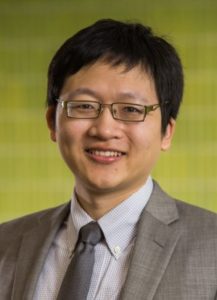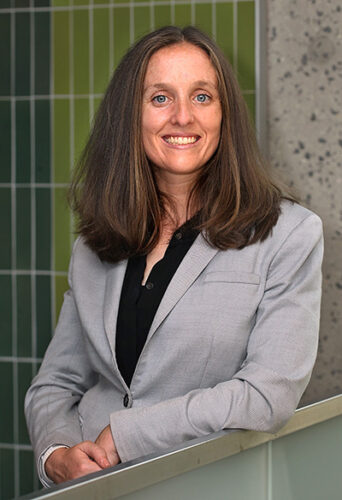Minjie Chen and Kelsey Hatzell promoted to associate professors
Power electronics researcher Minjie Chen and energy materials expert Kelsey Hatzell have been promoted to associate professors with tenure, effective July 1.
Minjie Chen

Chen, promoted to associate professor of electrical and computer engineering and the Andlinger Center for Energy and the Environment, is an expert in developing smaller, smarter, and more energy-efficient power electronics for converting and controlling electrical power in robotics and electric vehicles, information systems, and the grid edge — the region where electricity from the grid transitions to the end user.
In his lab, Chen works on power electronic systems capable of supporting the variable electricity load generated by renewable energy sources like wind and solar, which can threaten the power grid’s overall stability and reliability. Researchers in his group are even developing ways to enable those systems to automatically cluster into smaller microgrids and redirect electricity flows in response to external hazards such as extreme weather.
Additionally, Chen develops ultra-efficient and compact power electronics to meet the growing energy demands of data centers and information systems. For instance, he has demonstrated a technology that increases power delivery density to microprocessors by 10 times over current state-of-the-art systems, as well as a device eight times lighter and seven times smaller than conventional power delivery systems for large-scale data storage servers. His group has also developed a highly energy-efficient soft robot capable of moving from point to point using a single watt of electricity.
Chen joined the Princeton faculty in 2017. He holds a Ph.D. and S.M. in electrical engineering and computer science from the Massachusetts Institute of Technology, as well as a B.S. in electrical engineering from Tsinghua University.
Chen’s past honors include the Richard M. Bass Outstanding Young Power Electronics Engineer Award from the IEEE Power Electronics Society, the Lawrence Keyes, Jr. / Emerson Electric Co. Junior Faculty Award from Princeton’s School of Engineering and Applied Science, an NSF CAREER Award, the Dimitris N. Chorafas Ph.D. thesis award, and six IEEE Transactions on Power Electronics Prize Paper Awards.
Kelsey Hatzell

Hatzell, promoted to associate professor of mechanical and aerospace engineering and the Andlinger Center for Energy and the Environment, develops new materials and technologies for energy storage and climate applications.
In her research, Hatzell works to advance next-generation materials for energy storage, direct air capture, and membrane separations applications. Much of her pioneering work involves studying the performance of energy storage materials in situ and operando — in real-time and in real devices — to uncover novel insights into how those materials perform in dynamic settings. For instance, by studying solid-state batteries during charge and discharge cycles, Hatzell discovered nanoscale irregularities in the materials that accelerated battery failure. This finding paves the way for more stable devices.
Beyond energy storage and conversion, Hatzell’s work has revealed fundamental insights into materials for membrane separations and direct air capture that exhibit improved functionality and efficiency over existing technologies. For example, researchers in her group recently explored a new material for direct air capture capable of regenerating in response to changes in the surrounding humidity, which could yield energy efficiency improvements over five times greater than existing technologies.
Hatzell joined the Princeton faculty in 2021 from Vanderbilt University, where she was an assistant professor of mechanical engineering and chemical and biological engineering. She earned a Ph.D. in materials science and engineering from Drexel University, an M.S. in mechanical engineering from Pennsylvania State University, and a B.S.E. and B.A. in economics from Swarthmore College.
Hatzell’s past honors include a Camille Dreyfus Teacher-Scholar award from the Camille and Henry Dreyfus Foundation, the Alfred Rheinstein Faculty Award from Princeton’s School of Engineering and Applied Science, an early career grant from NASA to explore the science behind the temperature tolerance of lithium-ion batteries, a Young Investigator Program Award from the Office of Naval Research, and an NSF CAREER Award.